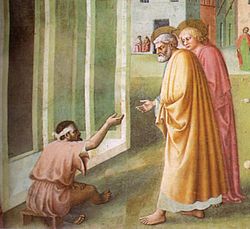
Aeneas (Greek: Αἰνέας, romanized: Aineas) is a character in the New Testament. According to Acts 9:32-33, he lived in Lydda, and had been a cripple for eight years. When Peter said to him, "Jesus Christ heals you. Get up and roll up your mat," he was healed and got up.
F. F. Bruce suggests that Aeneas was "one of the local Christian group, though this is not expressly stated."[1] According to David J. Williams, there is some ambiguity in the Greek text of verse 34, which contains the phrase στρῶσον σεαυτῷ (strōson seautō) normally translated as "make thy bed". The text would literally be rendered as Peter telling Aeneas to "spread for himself", which might not refer to his bedding, but something else he had been unable to do. Williams suggests it could, for example, mean "Get yourself something to eat".[2]
The account of Aeneas being healed is followed by an account of the raising of Dorcas.
See also[edit]
References[edit]
- ^ F. F. Bruce, Commentary on the Book of the Acts (Grand Rapids: Eerdmans, 1964), 210.
- ^ Williams, David J. (2011). Acts. Understanding the Bible Commentary Series. Baker Books. p. 166. ISBN 978-1-4412-3745-3.
Well, that’s interesting to know that Psilotum nudum are known as whisk ferns. Psilotum nudum is the commoner species of the two. While the P. flaccidum is a rare species and is found in the tropical islands. Both the species are usually epiphytic in habit and grow upon tree ferns. These species may also be terrestrial and grow in humus or in the crevices of the rocks.
View the detailed Guide of Psilotum nudum: Detailed Study Of Psilotum Nudum (Whisk Fern), Classification, Anatomy, Reproduction